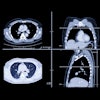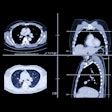Dear AuntMinnie Member,
If you routinely read CT lung cancer screening exams, how aggressively do you look for pathology in the heart? If you're not looking closely, you might want to change that strategy, according to a new study presented at this week's International Symposium on Multidetector-Row CT (MDCT).
In a talk on Tuesday, Dr. Mathias Proko, PhD, from Radboud University discussed how CT lung screening exams can find evidence of abnormalities -- such as coronary calcium -- that can be strong predictors of mortality on their own. Radiologists can provide a good rough estimate of risk in a patient simply through an overall visual assessment of calcifications, he said.
Learn more about Dr. Prokop's talk and the research backing it by clicking here.
In other news from MDCT 2015, check out this article for strategies on how to develop your own hanging protocols for reading CT scans on PACS. If you're not using automated hanging protocols, it's like going through your email inbox without a spam filter, according to Dr. Jeffrey Mendel.
And is the Uber business model a viable alternative for radiology as it struggles to adapt to a changing healthcare environment? It may not be such a far-fetched idea, according to a talk by Dr. Geoffrey Rubin, chairman of the International Society for Computed Tomography and master of ceremonies at this week's meeting. Learn his thoughts and those of others by clicking here, and visit our CT Community at ct.auntminnie.com for more coverage of the conference.
Thanks to everyone who logged on to our livestream of the MDCT 2015 proceedings, and see you online next year!
Does decision support work?
The idea of clinical decision support (CDS) in radiology has been a contentious one in recent weeks, with the publication of a controversial letter in the Journal of the American Medical Association that raised doubts about the technology. But an intriguing new study has found that clinical decision support can help radiologists -- even though CDS is usually thought of as a tool for referring physicians.
Over the course of two years, researchers in New York City tested a decision-support software application designed for radiologists. With CDS, radiologists were more likely to adhere to clinical guidelines and fewer cases were classified as "overmanaged." Learn more by clicking here for an article in our Imaging Informatics Community.


















